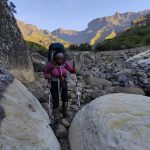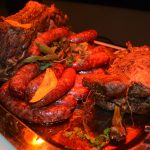RECOLLECTIONS OF A TRIBAL HYBRID
To me, there is absolutely nothing better than being Zambian. I love everything about my country, from the infectious excitement in the air when the Chipolopolo plays to the jovial voices in the market space. I love that first taste of juicy mango in a new season and I love the opportunity to travel around the country and take in vast, captivating landscapes.
But most of all, I love our linguistic diversity. I love the 73 tongues on our tongue. Belonging to a country with 73 different tribes means that I am privileged to have 73 different magical tunes flowing through my ears. Unfortunately, at times my country’s tribal diversity has become a basis of conflict.

My first vivid experience with tribalism was during my teenage years. I was disapproved because of my name – or rather, because of the tribe that it belongs to. With a Tonga first name, it did not even matter that, culturally, I also belong to the Bemba- speaking people – as indicated through my surname. It was not a big deal; this was a minor experience. As the years went by, I encountered more harsh prejudices and heard of others who had experienced worse.
Being a passionate anti-tribalist, I know the dangers that can arise due to this problematic ideology – especially considering the genocide in Rwanda and the Matabeleland massacres in Zimbabwe in 1994 and the 1980s, respectively. I wasn’t going to sit back and watch my beautiful country get torn apart because of unpractical discriminatory behaviour. So, I did what I have come to believe is one of my purposes; I wrote a book to address tribalism head on and encourage Zambians to instead embrace our national motto: ‘One Zambia, One Nation.’
I titled my book Routes because I intended to highlight Zambia’s metaphorical roots, which were planted in 1964 when we gained independence, and the routes that Zambia has taken since. Essentially, Zambia is rooted in our national motto, coined by our late founding father and first president Dr Kenneth Kaunda. The motto aimed to bring unity by discouraging tribal affiliations and it was well received in the 1960s. However, the spirit of tribalism managed to resurface as the year’s progressed.
Luckily, while tribalism persisted, tribal mixing did too. To an extent, one would suggest that this encouraged the reduction of tribalism – as a result of cultural mixing and interaction. It is through this interaction that people of mixed tribal heritage, such as myself, came to be.
Paternally, I originate from the North – where P.K. Chishala songs play on the radio as we harvest beans. Maternally, I hail from the South – where not even the sugarcane fields in Nakambala are sweeter than the sight of the Mosi-oa-Tunya (Victoria Falls). Growing up in a Bemba-Tonga home simply meant that I was exposed to two rich cultures and encouraged to embrace diversity.
Until my father’s passing, I witnessed my parents embracing each other’s cultural practices and adjusting their palates to accommodate each other’s traditional foods. To me, this was a perfect display of how engaging with other people’s cultures can open your mind to the world. It was also a perfect display of our national motto being embraced in many Zambian homes.
I saw no other way to challenge tribalism than to share my experiences through writing. I wrote Routes in 2016 during the peak of the election period and while I was in my second year at Rhodes University. It took me roughly three months to write the book, but five long years to finally publish. Dozens of my journalistic articles have been published since 2014, but publishing a book was a great lesson in patience.
Through my book, I hope that readers will be encouraged to be open to learning about each other’s cultures and eager
to embrace being Zambian and not only embrace their tribal identities. I hope Routes will remind us about our roots and the joy that comes from true patriotism. Ultimately, I hope that this book will be the door to conversations that encourage us to live like we are indeed one Zambia and one nation.



